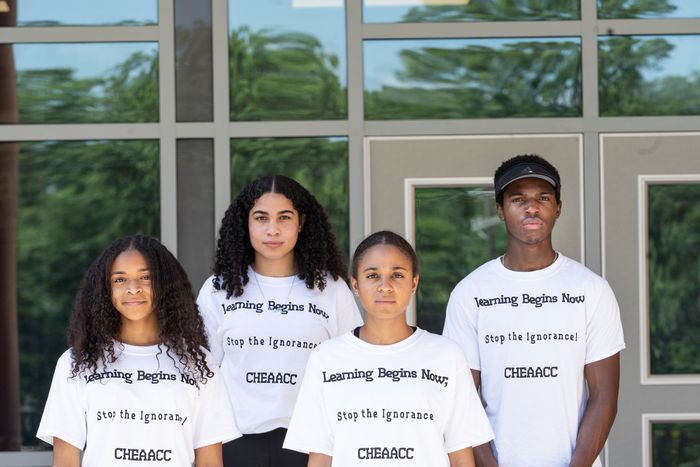PRO: African American History Course Requirement
Courtesy of the Philadelphia Inquirer and Jessica Griffin
“Some of the students who helped push for a mandatory African American history course are shown (Left to Right): Joy Thomas, Machayla Randall, Xandria McKinley, and Obinna Okorie, in front of Cherry Hill East High School last June.”
On the 24th of February, 2021, the Cherry Hill Public School District announced the institution of a mandatory African American history course, making Cherry Hill the first public school district in New Jersey to do so. The course will be a requirement for the incoming class of 2025 and beyond to graduate, and it will be taken for one semester. It will emphasize black excellence, as well as highlighting the history of institutionalized racism and current events, as opposed to the former curriculum that was in place. The former, flawed, curriculum limited teaching black history to a single month, where topics such as slavery and the Civil Rights Movement would only be brushed upon, failing to offer a deeper analysis of African American history. The status quo was in desperate need of change, and Cherry Hill East senior, Machayla Randall, catalyzed this change, fighting for equal representation in the classroom. “We were inspired by all the movements around George Floyd,” she says. “As students going through the Cherry Hill Public School system, we saw changes that could be made to benefit minorities.”
One of the most important parts of teaching is that every student feels represented in their classes — simply the majority of students do not cut it. In a predominantly white school district, it is imperative that no student feels that their history is invalid or not worthy of being talked about to the same extent as the majority. Randall compares the current history curriculum to a book, but tearing a few pages out of it and only teaching those pages. “We need to make sure that all groups are represented and can see themselves throughout history”. This type of teaching can have detrimental effects on students of color, only seeing a whitewashed version of history and not having historical figures of their own race to look up to. “It’s time that we changed that perspective,” Randall continues. In typical history classes, students learn only about the oppression of African Americans in history, rarely about their triumphs and excellences, which is what students are inspired by. High school is one of the most crucial times in a student’s life, as they are developing their views on the world and learning so much about themselves and others. This is especially important because teaching history from more than one perspective lends itself to a more diverse view on history, the world, and society.
The implementation of a mandatory African American History course is also beneficial because it would create a domino effect and spread to other schools. The force that the Cherry Hill Public School District creates by including this course will not go unnoticed by other schools in the state and country, and it will act as an inspiration for other school districts to implement African American History courses in their schools. Randall hopes the new course requirement will “provide students with a controlled environment to learn about these important topics” and “change the traditional mindset that students have”. With so many students now receiving a more well-rounded background on black history, it can only create a better future and racial awareness for all students.
Black history is American history, and it should be treated as such. Learning about black history should never be limited to only Black History Month, and the curriculum needs to go beyond the typical events taught, providing deeper analysis and understanding for all students. Students should have a wider range of historical black figures, not limited to the few token civil rights figures like Rosa Parks or Martin Luther King Jr. Instead of learning about how African American history fits into the background of white narratives, the curriculum should exist on its own, not in relation to European history. “A lot of people are afraid to get involved with racial issues because they don’t understand or are afraid to say the wrong thing,” says Randall, but she is confident that this course requirement will improve the mindset of students in future years and inspire other students like herself to bring up these types of issues.


